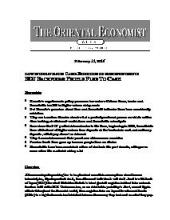Report
TOE Alert: BOJ Negative Rates Backfire; People Move to Cash Instead of Stocks
posted by Richard Katz on February 11, 2016

Report Cover
Headline
Kuroda’s fundamental assumption is that firms, financiers and consumers would all like to make higher returns than small, or negative returns.
Abstract
Key points in Richard Katz's report include:
- Kuroda’s negative rate policy presumes low rates will force firms, banks and households to shift to higher-return risky assets
- But Kuroda’s premises about firm and household behavior have been consistently mistaken
- They are based on theories about what a perfectly rational person would do rather than looking at what real-world firms and households actually do
- Ever since the BOJ pushed interest rates to the floor, beginning in 1995, households have shifted out of higher return time deposits at the banks into cash and ordinary deposits, which pay almost no interest
- They have not increased their purchases of insurance annuities
- Pension funds have gone up because people have no choice
- Households have been consistent sellers of stocks in the past decade, selling even more when the market is rising a lot


